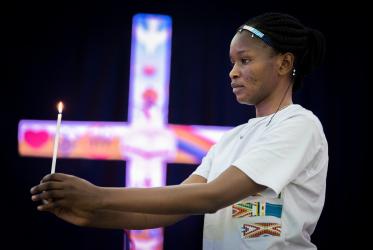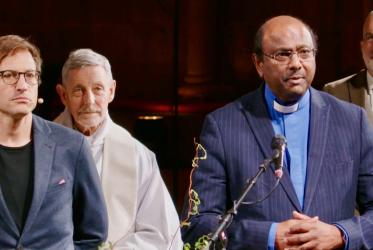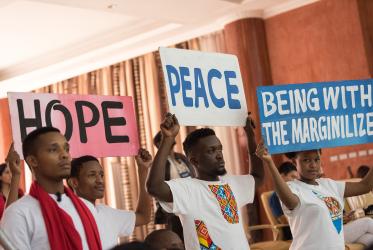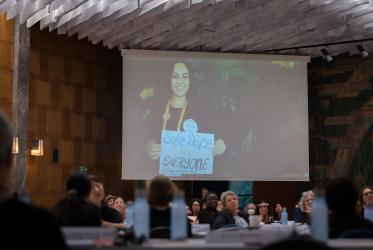By Stephen Brown*
Five decades after publication of his ground-breaking Theology of Hope, German theologian Jürgen Moltmann continues to insist on the power of hope in the "coming of God" as a force for the transformation of the world.
"All theological efforts of my life have been dedicated to an ecumenical Christian theology of the coming of God," Moltmann said in a lecture in January at the Ecumenical Centre in Geneva to mark publication by WCC Publications of the English translation of his new book, The Living God and the Fullness of Life.
The book is a series of meditations on what it means to live, to think and to hope in the presence of God's love, with Moltmann, who turns 90 in April, reflecting on the themes of his writings over his long theological career.
"In human beings, knowledge of the 'living God' awakens a thirst and hunger for life," writes Moltmann in the book. "It makes them dissatisfied with what they are, and impels them to look for a future in which more life will enter the lives they already have." [1]
The insistence on such future-oriented, divinely-inspired dissatisfaction is one that has been present in Moltmann's theology since publication of Theology of Hope in 1964.
"Those who hope in Christ," Moltmann wrote then, "can no longer put up with reality as it is, but begin to suffer under it, to contradict it. Peace with God means conflict with the world, for the goad of the promised future stabs inexorably into the flesh of every unfulfilled present.”
Such hope, he continued, "makes the Church the source of continual new impulses towards the realization of righteousness, freedom and humanity here in the light of the promised future that is to come."[2]
It was a message that chimed with the turbulent 1960s, marked by student protests in Europe, the civil rights movement and demonstrations against the Vietnam War in the United States, and demands from Africa, Asia and Latin America for economic as well as political liberation. Yet, more than 50 years later, Moltmann's message still continues to inspire.
"The discourse of hope, what may be hoped for and how we speak realistically of hope is so important these days. It's rare that you can just quote things that were written 50 years ago," says Archbishop Antje Jackelén of the Church of Sweden, who studied under Moltmann at the University of Tübingen in the 1970s.
"The question of hope is so important for people," says Jackelén, whose book, Time and Eternity, includes a critical appreciation of Moltmann's contribution. "The climate change challenge, the unrest in the world, the refugee situation - all these things make people ask for hope."
Moltmann's work has ranged widely, covering issues such as creation and ecology, the insights of liberation and feminist theology, and the work of the Holy Spirit, which brought him into contact with Orthodox theology and Pentecostalism.
Of her studies with Moltmann, Jackelén remembers most a seminar on the theology of mystical experience, during which he took his students to a Benedictine monastery to experience meditation and undertake spiritual exercises.
"It appeared to us something like a turn from political theology to mystical theology but in fact what I came away with is that these are two sides of the same thing, to keep together ethics and mysticism, action and contemplation," she says.
Born into a secular family in Hamburg in 1926, Moltmann's interest in theology was awakened as a prisoner-of-war in Britain after the Second World War. One of the camps in which he was held organized educational programmes, including visits from figures such as Willem Visser 't Hooft, general secretary of the World Council of Churches (WCC), then in process of formation.
"Moltmann's experiences of the church began abroad; from the start they were ecumenical," notes his biographer, Geiko Müller-Fahrenholz. "So from the beginning this ecumenicity was the hallmark of his theology."[3]
Moltmann himself has been a committed supporter of the ecumenical movement, spending 20 years from 1963 to 1983 as a member of the WCC's Commission on Faith and Order.
The Theology of Hope resulted from Moltmann's fascination with the writings of Ernst Bloch, a German philosopher who settled in the communist German Democratic Republic (GDR) after the Second World War but who fell into official disfavour because of his unorthodox Marxist stance. When the Berlin Wall was built in 1961, Bloch failed to return to the East from a visit to the West and instead took up residence in Tübingen, where Moltmann would later be a professor.
Bloch's major work, the three-volume Principle of Hope, drew on the Old Testament motif of Exodus to argue for hope as the framework for human action.
Writing in The Living God, Moltmann recalls, "I asked myself: Why has Christian theology allowed this theme of hope to escape it? Are not God's promises and human hopes the scarlet thread running right through the prophets of the Old Testament and the apostles of the New?"
The Theology of Hope, Moltmann writes, was intended "to set in motion an act of theology parallel to [Bloch's] Principle of Hope, but on a biblical basis."[4] To the Old Testament motif of Exodus, Moltmann added the New Testament theme of the resurrection of the crucified Jesus in the light of God's promise of the future kingdom.
"With the Theology of Hope in 1964 I participated in a general conversion to the future," Moltmann recounted in his Geneva lecture. Like other theologians of his generation, he wanted to break out of an inward-looking theology directed at the church and instead develop a political theology "with a face to the world."
One example of such theology, Moltmann said, was the political theology of peace in the divided Germany that heralded the massive protests in the GDR in 1989 and eventually led to the end of the Berlin Wall and the unification of the country. This was also a movement that Moltmann's own writings helped engender.
"For me and my friends in the GDR, Moltmann's theology was quite literally revelatory, especially given its contextual approach and its awareness of the contemporary situation," notes Heino Falcke, an East German theologian long active in promoting change in the GDR. "In the 1960s, after the building of the Berlin Wall, it encouraged us to work, nevertheless, for a socialism open to history, able to change and to be made more human."[5]
Since the tumultuous changes of 1989, however, theologians have turned their focus to the academic community, Moltmann regretted in his Geneva lecture. Instead, Christian theology, he argued, needs to hold together the Christian, the public and the academic communities as "an all-embracing function of the kingdom of God."
Moltmann has long been concerned about the implications of ecological issues for theology, publishing God in Creation: An Ecological Doctrine of Creation in 1985, and in recent years the environmental challenge has taken on even greater urgency.
"We are standing today at the end of the modern age and at the beginning of the ecological future of our world, if our world is to survive," Moltmann warned in Geneva. "We need a new concept of the nature of the earth and a new image of the human being and destiny, and with these a new experience of God in our culture."
This demands a shift, he said, from "world politics" to "earth politics" and for world religions to understand themselves as "earth religions" in which they contribute to a new understanding of life and the earth, founded on a "sacramental spirituality of the earth as Orthodox churches proposed already decades ago in the WCC."
Fifty years after Theology of Hope, the future of theology remains for Moltmann a theology of the "coming God" in which hope, through visions, dreams and projects, kindles the imagination to transcend the limits of reality into the sphere of the possible.
"The theological power of imagination sees this mortal life in the future of the eternal life which comes," Moltmann insisted in Geneva, "and this human history in the future of the coming God's judgment and kingdom."
Jürgen Moltmann's book, The Living God and the Fullness of Life, is published by WCC Publications (ISBN 978-2-8254-1664-8) and available for purchase in on- and offline bookstores, including Alban Books in the UK and Europe, and Amazon.
Jürgen Moltmann's article, "A Common Earth Religion: World Religions from an Ecological Perspective," published in the Ecumenical Review in 2011, is available here (free access)
Full video: Professor Moltmann at the WCC: Lecture on the Future of Theology
*Stephen Brown is a freelance writer. He is the author of a study on the role of the churches in East Germany's "peaceful revolution" of 1989, and a contributor to the Encyclopedia of Contemporary German Culture (Abingdon/New York: Routledge,1999), including the entry on Jürgen Moltmann.
[1] Jürgen Moltmann, The Living God and the Fullness of Life (Geneva: WCC Publications, 2016), 23.
[2] Jürgen Moltmann, Theology of Hope: On the Ground and Implications of a Christian Eschatology (Minneapolis: Fortress Press, 1993), 21-22.
[3] Geiko Müller-Fahrenholz, The Kingdom and the Power: The Theology of Jürgen Moltmann (London: SCM Press, 2000), 22.
[4] The Living God, 177-8
[5] Heino Falcke, 'Phantasie fur das Reich Gottes: Der theologische Weg Jiirgen Moltmanns', Evangelische Theologie, vol. 61, no. 2, 2001, 159.






